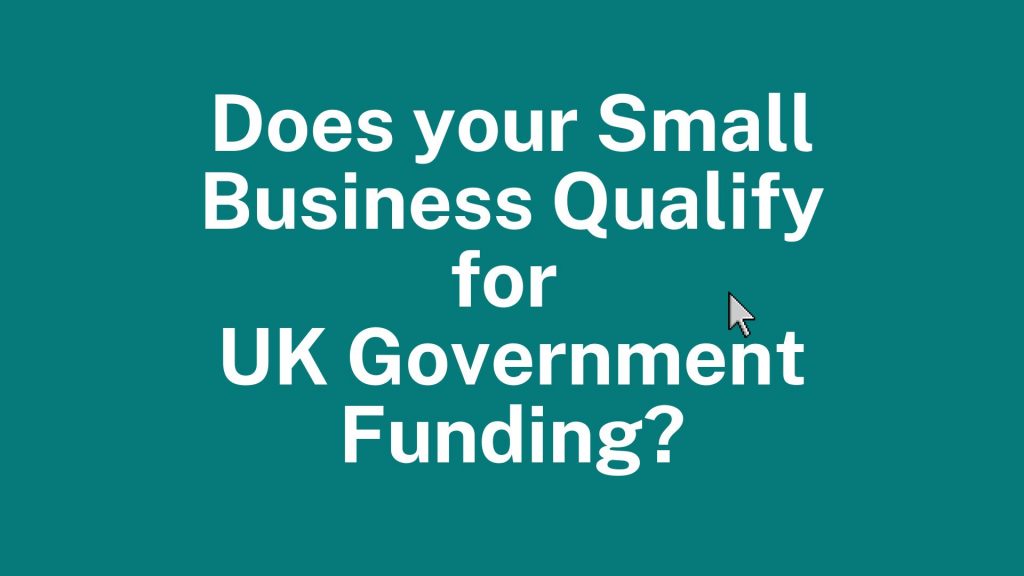Know If Your Small Business Qualifies for Government Funding
Category: Funding & Financing
Tags: Government Funding, qualify for funding, small business funding
Additional revenue is always welcome for any small business. To turn a profit, however, your small business must first spend money, and in order to do so, you must first have money. You can get your business off the ground with help from the government.
Numerous levels of government, from city councils to regional offices to the national government in the UK, all contribute to the hundreds of different government funding programmes available across the nation.
Most small businesses in the UK are eligible for at least some of the government funding programmes available to them.
Although there are roughly 1,500 distinct funding programmes across the country, not everyone is qualified to receive funding from all of them. Finding the few specific funding options you can actually benefit from is much easier when you know if your small business is eligible for government funding.
How, then, do you zero in on the best options?
Is your small business eligible for government funding?
In total, there are more than 1,500 grant opportunities.
These grants and loans are constantly opening and closing, and what is available today might not be tomorrow. As a result, the landscape of government funding is hectic and complex.
Be proactive in your search for government funding for your small business, checking frequently to make sure no avenue is missed.
There are a few things you need to do before you can find out if you qualify for government funding and make the most informed decision possible:
- Make sure that you have a solid business plan
- Have a breakdown of your funding requirements.
- Stay on-top of the funding options (checking daily).
There is a tendency for the best funding opportunities (those with the most available money) to disappear soon after they are announced. When new programmes are introduced, business owners typically waste no time in signing up for them.
The good news is that the majority of government funding programmes support a much larger number of businesses than just one or two. Depending on the problem it aims to solve in a given industry, a typical programme will have a budget anywhere from £500,000 to £2,500,000.
Because of the limited amount of these grants, the government typically imposes a cap on how much any one company can receive. A specific funding option with a budget of £25,000 to £50,000 can fund quite a few business owners, as this is the typical range for low-level government funding.
In order to be first in line to apply for these possibilities when they become available, you should get ready in advance (ready to go). Your business plan is the typical example of this.
Your Business Plan
Your business plan should explain how the funds you’re requesting will be used to expand operations and grow the company, as well as how this will benefit the economy as a whole.
If you haven’t already done so, use the Business Plan Builder Tool to create a plan that will impress the various government funding agencies.
After you’ve completed your business plan, it’s time to zero in on the specifics of your funding request.
To increase your chances of receiving funding from the government to meet your needs, you should be as detailed as possible.
Breaking down your funding requirements
It’s possible that various government funding agencies have distinct areas of interest, sectors of expertise, and financial needs.
If you want to get the most bang for your buck, it’s best to get specific about what it is your business needs money for.
You will have a better chance of getting all of your needs funded if you provide a detailed breakdown that shows an allocation of how much money you need for each of those requirements.
Always keep in mind that not all funding agencies will be able to cover your entire request, so asking for multiple “smaller” amounts will increase your chances of being approved for government funding.
If you want to be eligible for the best government funding options after you’ve sorted all this out and determined exactly how much money you’ll need, checking in on a regular basis is a good idea.
Funding programs change daily at times and it’s very easy to miss an important update via the various government agencies – working with an expert to help you with a search, or using tools such as the Funding Database can be of value.
Stay up to date with the government funding
Now that you’re prepared to evaluate your company’s potential eligibility for available programmes, it’s a good idea to become familiar with how frequently these offerings are revised.
First, check out what’s available in your immediate area. The eligibility requirements for local funding programmes are often the least stringent and the funding itself is often the most accessible.
The next logical step is to look to the state and federal governments for assistance.
Second, before applying for funding, make sure you meet the program’s criteria. Some grants are only available to a select group of businesses, while others have a narrower focus on a particular goal that you may be able to benefit from.
Remember that not everyone qualifies for the same programmes, and that you must adhere to the stringent requirements that each agency has in order to determine your eligibility based on your individual circumstances.
Third, once you locate a programme, make sure you are aware of any application due dates. What’s the closing time? If that’s the case, get your application in before the cutoff time. You want to strike a balance between arriving too early and staying too late. Generally, you should give yourself three to four weeks prior to the deadline to submit your information or application.
Asking for assistance, whether with a business plan, a breakdown of funding, or determining eligibility, is never a bad idea. If you want your business to succeed, you need to make sure it can attract financial backing.





